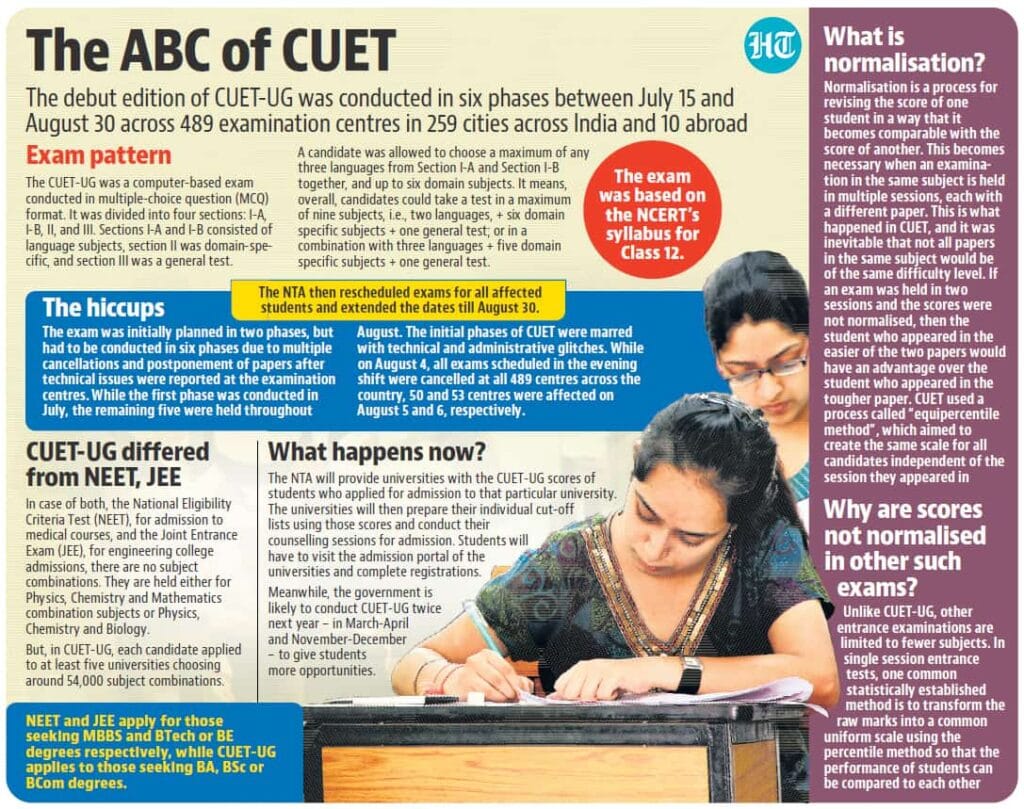CUET-UG results: Ball set rolling for DU admission process
Admissions to all undergraduate programmes in colleges under DU will take place through the Common Seat Allocation System (CSAS) in three phases, the first of which began on Monday.

New Delhi: With the results of the Common University Entrance Test for undergraduate courses (CUET-UG) having been declared, those applying to Delhi University colleges can now sign up for the Common Seat Allocation System (CSAS), the new process through which the varsity will now carry out admissions.
Admissions to all undergraduate programmes in colleges under DU will take place through the CSAS in three phases. Phase I, which kicked off on Monday and will continue till October 10, requires students to submit their personal details, Class 12 marks, category preference, and documents on the admission portal.

The second phase will begin on September 26 and will continue till October 10. In this, candidates must choose the programme/s and colleges in which they want admission. They will need to confirm the programme-specific CUET (UG) – 2022 merit score for the selected programmes, and fill in the order of preferences for the various combinations and colleges that they want to apply to.
“The programme-specific merit score shall be auto-calculated by the University as per the eligibility criteria, and the candidate will have to confirm his/ her scores before making the preferences. The candidate must select as many programs he/she wishes to and it is in the best interest of the candidate to choose maximum programs and program plus college combinations,” said DU registrar Vikas Gupta on Friday.
Candidates can choose as many programs as they wish to join, provided they meet the specific eligibility of the selected programs. The order of selection of the program plus college combination will determine the opted preference order for the allocation of seats. The university will create a merit list based on CUET scores on the basis of which students, subject to candidate categories and seat availability, will be provisionally allotted their first possible preference. Separate merit lists will be declared for candidates seeking admission in supernumerary (other) quotas.
As per the procedure outlined by DU on Friday, the varsity will create a merit list based on a summation of the normalised marks of the papers that make up the eligibility criteria of a given programme.
CUET 2022 exam had three sections. The first was divided into two parts comprising 13 languages in the first and 20 languages in the second part. For admission to DU, it was mandatory for candidates to appear in at least one language out of these parts. Section II of CUET comprised 27 domain-specific subjects. DU picked 18 domain-specific subjects out of the 27 subjects which have been categorised in List B1, while nine other subjects have been categorised in List B2. The list of subjects is outlined in DU’s admission policy.
The university will not be issuing separate merit lists for each of its UG programs and will issue one merit list for programs that have the same eligibility criteria for admissions. For example, admission to most humanities courses required the candidate to appear in any one language and any three subjects from different lists. The varsity will issue a merit list based on these programs.
“After the closure of the preference-filling phase II of CSAS, the university will release a simulated list of tentative allocations based on the allocation policy. Henceforth, a two-day window will be provided to the candidates to reorder their program and college preferences,” said Gupta.
The third phase of CSAS will deal with seat allotment and admission based on the college/course preferences as given by candidates. The first list of admissions shall be notified by October 10. Candidates will be required to accept their allocated seats within a specified period. If they do not do so, it will be deemed as non-acceptance of the allocated seat. They will be removed from the allocation process and will not be able to participate in subsequent rounds of allocation.
Manoj Khanna, principal of Ramjas College, which announced a 100% cutoff for admissions to political science, physics and BA programme last year, said that the CUET will help to tackle the problem of over-admission that colleges grappled with under the previous cutoff-based process. “Every year, colleges would end up admitting twice or thrice the number of students. This is a new experiment but the possibility of over-admission is over to a large extent,” said Khanna.
Kalpana Bhakuni, principal of Kamala Nehru College, said that it was too early to gauge the impact of CUET results on the admission situation in colleges. “We will have to wait and watch how the situation develops. It’s a new system this time. While there are concerns among students about the number of 100 percentile scorers, they should rely on the university’s admission policy,” said Bhakuni.



